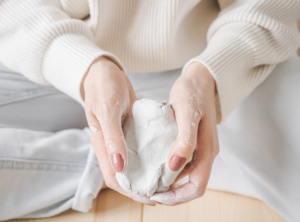Case Study: Navigating difficult emotions using modelling clay
Background and presenting issues
Alice* was referred to the NIDAS Art Therapy service from CAHMS (Child and Adolescent Mental Health Services) following two attempts to take her own life. Alice had previously accessed NIDAS support from the Teen Outreach Worker who offered her practical and emotional support for domestic abuse.
Art Therapy was chosen for Alice to try to help her to express her thoughts and emotions regarding the trauma she had experienced. Alice’s mother had passed away from alcohol and substance abuse, Alice had been groomed online from an early age, and she had also been subjected to emotional, physical, and sexual abuse in her own intimate relationships. As a result of the trauma she had experienced in her life and the loss of people close to her, Alice had a tendency to form unhealthy attachments to males; the need for her to be loved is important, and to Alice, this is measured by males wanting to have sexual encounters with her.
At her request, Alice was withdrawn from education by her father as she didn’t feel supported by the school with regards to her mental health needs and the difficulties she had with sustaining positive peer relationships. Alice felt very isolated and had social anxiety issues about bumping into people she knew outside in the community.
Alice was known to self-harm and smoked cannabis as a way of coping with her emotions and anxiety.
Art Therapy referral
Alice was referred to Art Therapy to help her to process the trauma and loss she had experienced in her life with the aim of providing her with healthier strategies to manage her self-harming behaviours, and to better regulate her feelings and emotions.
Art Therapy was to provide Alice with a safe, non-judgmental space where she could feel accepted and listened to empathetically, and to help her to better understand her experiences of domestic abuse. The service also helps with overall wellbeing and self-confidence.
Engagement with the Art Therapy process
Alice attended 10 Art Therapy sessions and engaged with the process well, forming a good therapeutic alliance. The sessions are delivered using a psychodynamic and trauma informed approach, and Alice was seen on a 1-1 basis once a week for one hour.

Alice used all the sessions effectively and through the engagement of art materials, she began to explore difficult feelings in relation to the abuse she had experienced. She also expressed herself creatively and ‘felt like a child again’. Within the sessions, Alice focused on using modelling clay to create objects as an outlet to process unconscious feelings and communicated an integration of emotions, memories, and fantasies from different levels of consciousness. The clay work allowed her to form intangible characters, which became objects for her to project her feelings onto; they served as scaffolding for working through complex feelings she had towards her abusers. Working with clay enabled Alice to sculpt forms with differentiated aspects and juxtaposing qualities, and by looking at the clay products, Alice started to discover her own conflicting feelings, which allowed her to safely explore these further with the therapist.
Outcomes
Alice created her own story around the domestic abuse she had experienced, which has help to make sense of life events using art materials at a distance where she feels safe. Alice was comfortable to talk openly about her feelings and what she might be struggling with. She was confident enough to express her gratitude for attending the Art Therapy sessions.
Engagement in clay work is a useful tool to use when a client is self-harming or has a history of self-harming; there is research to suggest that engaging in clay can reduce urges to self-harm and it plays an important role in emotional regulation as a foundation for other reparative processes, such as attachment, atonement, and self-expression.
By the end of the sessions, Alice was beginning to develop healthier ways to manage her self-harming behaviours by talking through her emotions with the therapist. She seemed to value the time and space to express herself creatively and to talk to a female figure as she lacks a female role model in her life. Alice presented herself more confidently and was able to make better choices in her life, however, she still has a lot of trauma and loss to process.
Although she was processing many difficult feelings during the sessions, Alice took a lot of enjoyment from each session, and is slowly taking ownership of her life back. Following her successful engagement with Art Therapy, Alice was offered ongoing therapy to support her further.
NIDAS Services
Find out more about how we can support women and families affected by domestic abuse here.
*Name changed for confidentiality purposes